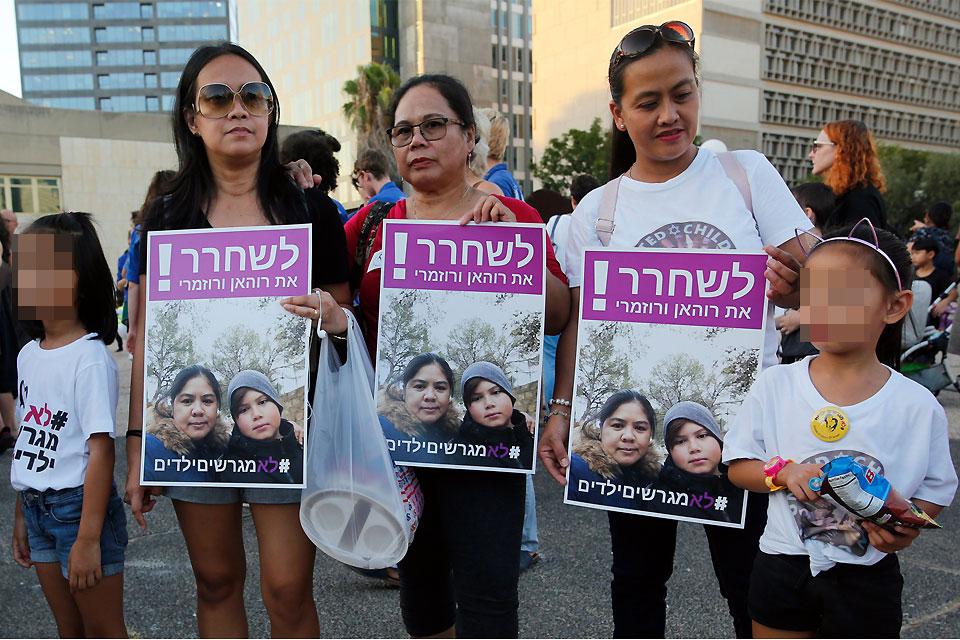Born in Israel, hundreds of Filipino children risk expulsion

Tel Aviv, Israel — In the heat of the summer, Sivan Noel and her sister Michal say they rarely venture outside of their family’s small, basement apartment in Tel Aviv.
The two girls, 11 and nine, risk being deported to the family’s home country, the Philippines, even though they’ve never set foot there.
“I was born here,” said Sivan, the 11-year-old.
“It’s really unfair that after being born here and having a family, friends, school and studies, we are being told that ... we now must leave to a place that we hardly know."
They and hundreds of other Filipino families in Israel are caught up in a legal battle that has put them at risk of deportation.
Many of the 28,000 Filipinos in Israel arrived to work as caregivers and domestic helpers, but according to the United Children of Israel (UCI) association, some 600 families could now face expulsion over a loss of residency status.
The issue holds particular resonance in Israel, where there are long-term fears about maintaining a Jewish majority in the country founded as a national homeland for Jews in the wake of the Holocaust.
But children such as Sivan and Michal pose a special case.
They were born in Israel, attend school in the country, speak and write on social media in Hebrew and dress in the same tank tops, shorts and sandals as other children in Tel Aviv.
Their mother, Ramela Noel, arrived legally in the country in 2003 as a domestic worker.
She later met her husband, who is also Filipino, and became pregnant with Sivan, the oldest of the two girls.
She then faced a heartbreaking choice: either leave the country or send her child to the Philippines in order to maintain her visa, as spelled out in her employment contract.
‘I started crying’
Noel said she initially chose to remain and send her child back to the Philippines to live with her sister, Sivan’s aunt.
“When I gave birth to Sivan and they put her on my tummy, that’s when I started crying,” the 39-year-old said, the memory again bringing tears to her eyes.
She couldn’t bring herself to send the baby away, so the family began to live clandestinely.
The two girls have no legal status and their parents cannot renew their work visas without risking expulsion.
Noel and her husband scrape out a living cleaning homes.
“Every time we go out on the street—the fear that I have every time I go on the street—it’s terrifying,” she said.
This week, a mother and her 13-year-old child were detained in southern Tel Aviv ahead of a planned deportation.
Since the start of the year, members of 36 families, 24 of them Filipino, have been arrested.
They were released on the condition they leave by August 1, but no one has been deported for now, according to UCI, created to help those involved.
The adults were arrested for being in the country illegally, but their children were allowed to finish the school year, according to a statement from Israel’s immigration authority, which declined an interview request.
With the school vacation underway, the threat of deportation is back.
“Israel encouraged them to come. There are recruitment services abroad for them, said Sigal Rozen, one of the founders of the Israeli organization Hotline for Refugees and Migrants.
Filipinos were brought to Israel to fill a labor shortage.
One member of UCI who spoke on condition of anonymity said she cared for the elderly for nine years.
“What do you expect me to do in nine years? Not to have sex, not to have love?” she said.
‘Not make me forget’
In 2006 and in 2010, while facing criticism to act, Israeli authorities granted permanent visas to nearly 5,000 people, said Rozen.
Catholic church heads have joined condemnations of the deportations, asking in a statement: “Does this policy respect the contribution of these women’s labor to the Israeli society?”
Filipinos recently held a protest in Tel Aviv, supported by Israelis.
“We can’t send children away,” said 83-year-old Drora Lustiger, who said her husband survived the Holocaust.
Nearby, separated from the crowd by a security cordon, around a dozen counter-protesters called for the deportations to move ahead.
“I’m concerned about the majority of the Jewish in Israel,” said Sigal Sudai.
“In many other countries in the world, when their visa ends, they go back to their land.”
But Sivan and her sister, who have never traveled, say they consider Israel home.
“It would feel like I’m in a foreign place, a place that I don’t know,” said Sivan.
“Maybe I will meet new friends or have new memories there, but it will not make me forget that I have friends here, and a family.” —Agence France-Presse




